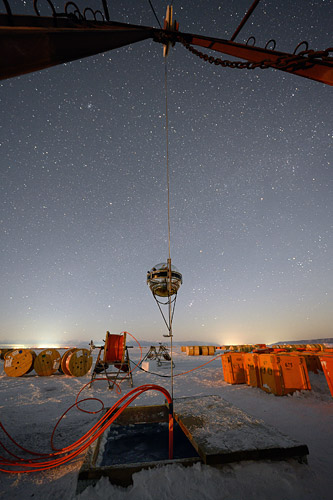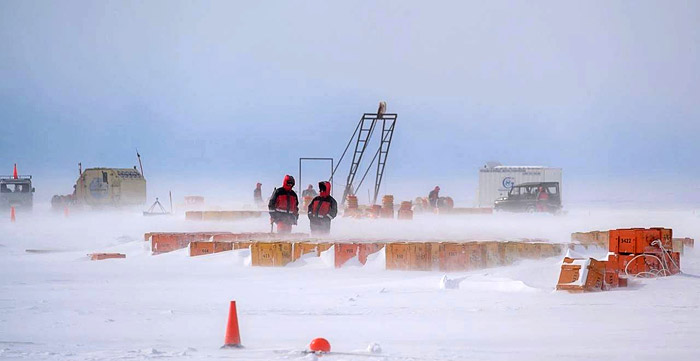
Electronic english version since 2022 |
The newspaper was founded in November 1957
| |
Projects of the XXI century
Baikal-GVD: 2023 expedition completed
During the winter expedition of 2023, the Baikal-GVD collaboration installed two new telescope clusters, repaired and upgraded already installed detector components and carried out further work on developing the data transmission system via optical lines inside the facility.
The Baikal-GVD neutrino telescope is designed to register and study superhigh-energy neutrino fluxes from astrophysical sources. Scientists will study not only the processes with a huge release of energy that occurred in the distant past, but also the evolution of galaxies, the development of supermassive black holes and the mechanisms of particle acceleration using the Baikal-GVD neutrino telescope.
The Baikal Neutrino Telescope is a neutrino detector located in Lake Baikal at a distance of 3.6 km from the shore, at a depth of about 1300 m. This unique scientific facility is an important tool for multichannel astronomy, a new powerful technique for studying the Universe. Baikal-GVD is one of three active neutrino telescopes in the world and along with the IceCube telescopes at the South Pole and the Cubic Kilometre Neutrino Telescope in the Mediterranean is part of the Global Neutrino Network (GNN).
 The Baikal-GVD telescope is the largest in the Northern Hemisphere and the second largest in the world. To date, 12 clusters have been put into operation, located at a distance of 250-300 m from each other. Since 8 April, 2023, they have been working in data accumulation mode. Each cluster is an independent detector of 8 vertical garlands, on which optical modules are positioned (36 on each garland). The telescope currently contains about 3500 photodetectors. According to the project, the facility volume by 2027 should be about one cubic kilometer.
The Baikal-GVD telescope is the largest in the Northern Hemisphere and the second largest in the world. To date, 12 clusters have been put into operation, located at a distance of 250-300 m from each other. Since 8 April, 2023, they have been working in data accumulation mode. Each cluster is an independent detector of 8 vertical garlands, on which optical modules are positioned (36 on each garland). The telescope currently contains about 3500 photodetectors. According to the project, the facility volume by 2027 should be about one cubic kilometer.
"The 2023 season turned out to be a test of the strength of the expedition team. The weather also tried to toughen this test but to be fair it provided us with reliable ice until the ice work was completed. However, despite the prevailing conditions, during the expedition, the scheduled systemic changes were implemented both in the preparation of the equipment and in the technological plan for the deployment of the facility. I would like to note the increased professional level of the team that with the forced reorganization almost completely coped with the scheduled tasks," Head of the Expedition, Head of the JINR Laboratory of Nuclear Problems of JINR Igor Anatolievich Belolaptikov notes.
"The planned step to increase the efficient volume of the detector was successfully implemented during this expedition. Before the completion of the initial project of developing a high-energy neutrino detector with an efficient volume of the order of a cubic kilometer, two or three such steps are to be done. The contours of the plan for the further development of a detector based on a fiber-optic data acquisition system are currently drawn," Head of the collaboration, Corresponding Member of the Russian Academy of Sciences, Head of the Laboratory of High Energy Neutrino Astrophysics at the INR RAS Grigory Vladimirovich Domogatsky says.

The Baikal-GVD neutrino telescope is constructed by an international collaboration with the leading role of the Institute for Nuclear Research of the Russian Academy of Sciences (Moscow), the founder of this experiment and the direction "High Energy Neutrino Astronomy" in the world and the Joint Institute for Nuclear Research. In total, more than 70 scientists and engineers from nine research centres in Russia, the Czech Republic, Slovakia and Kazakhstan participate in the project.
The 2023 expedition was organized by the Institute for Nuclear Research of the Russian Academy of Sciences and the Joint Institute for Nuclear Research.
www.jinr.ru
photo by Bair SHAYBONOV